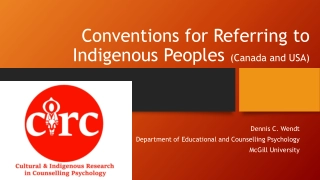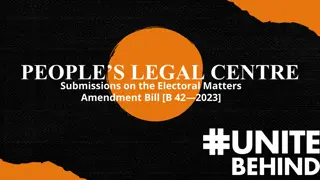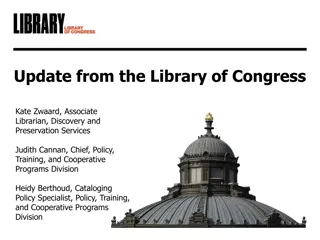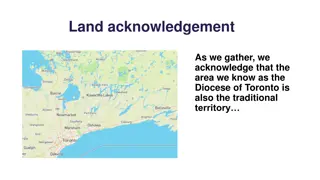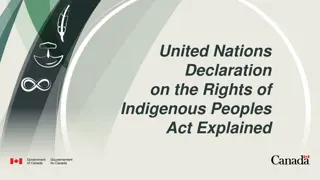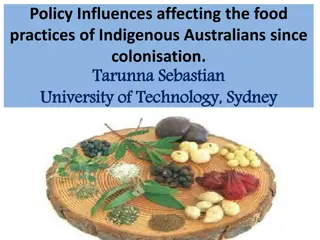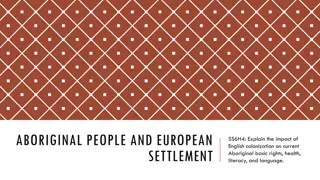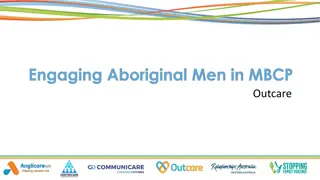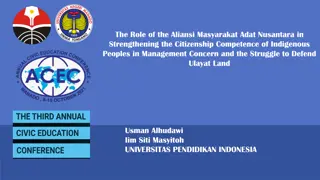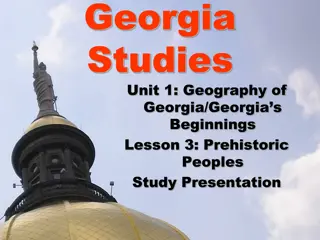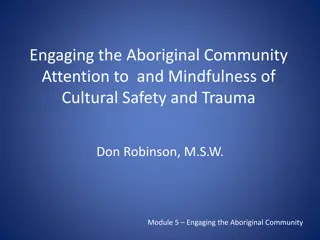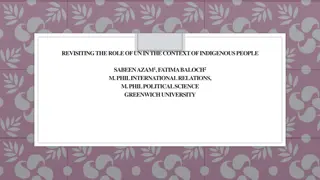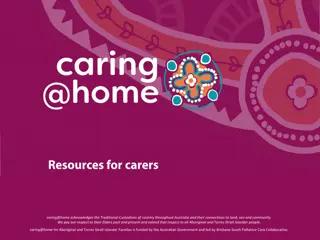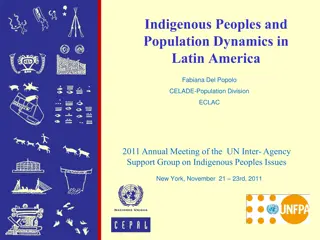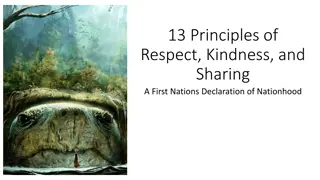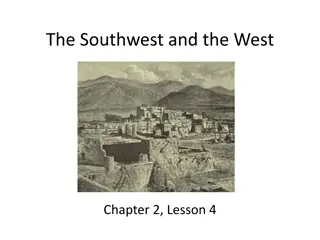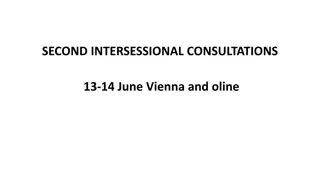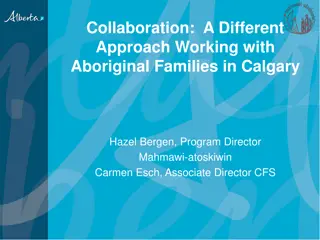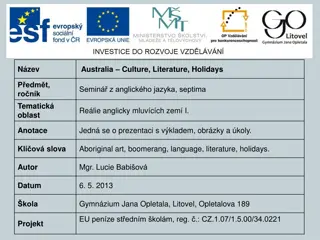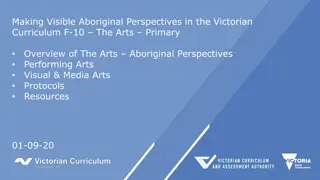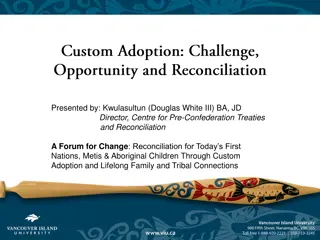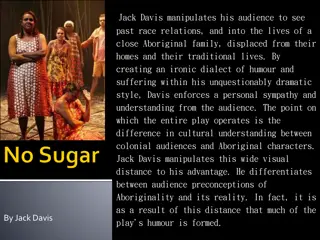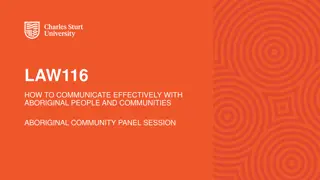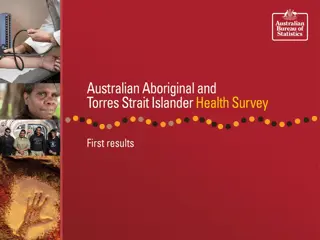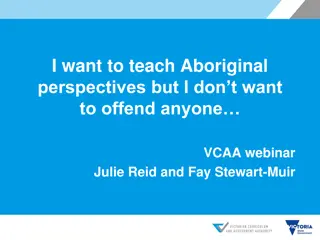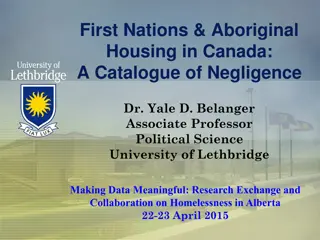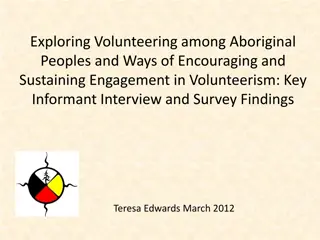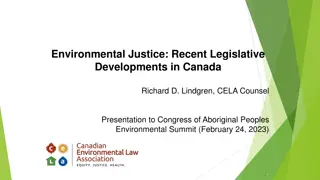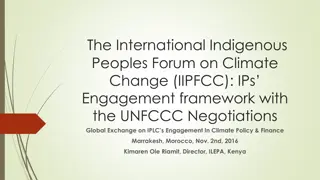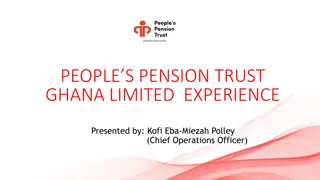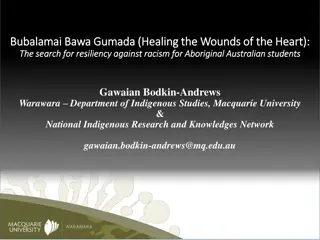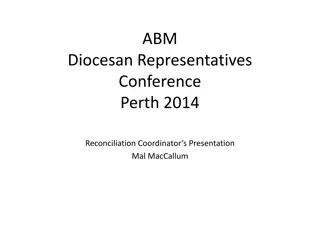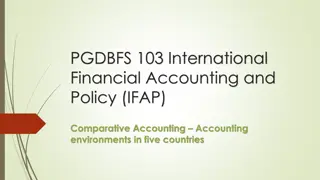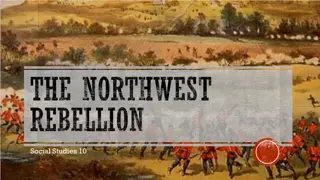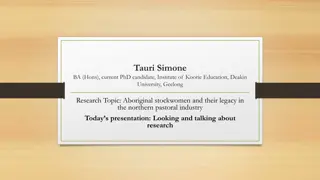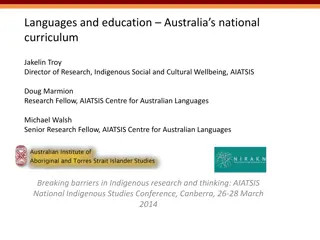Conventions for Referring to Indigenous Peoples in Canada and the USA
This article outlines guidelines for referring to Indigenous Peoples, emphasizing specificity and respect for preferred names and terms. It discusses the importance of capitalizing terms related to Indigenous Nations and cautions against using terms implying colonial possession. The use of terms lik
1 views • 24 slides
Peoples Legal Centre Submissions on Electoral Matters Amendment Bill
Peoples Legal Centre's submissions on the Electoral Matters Amendment Bill focus on increasing access to justice, deepening democratic participation, and advocating for a just and equal South Africa. The main themes include amendments on donations to political parties, regulations for independent ca
2 views • 17 slides
Update from the Library of Congress on Indigenous Peoples' Land Acknowledgment and Terminology Challenges
The Library of Congress recognizes the importance of acknowledging Native American land and is committed to rectifying incorrect and offensive subject headings for Indigenous peoples. Challenges in terminology and necessary changes are addressed to show respect for Native cultures.
1 views • 18 slides
Acknowledgement of Indigenous Territories in the Diocese of Toronto
The Diocese of Toronto acknowledges the traditional territories of the Anishnaabe, Haudenosaunee, and Wendat peoples, along with the Dish with One Spoon Wampum Belt Covenant. They express gratitude for Indigenous stewardship of the land, recognize historical injustices, and commit to fostering an ho
0 views • 8 slides
Understanding the United Nations Declaration on the Rights of Indigenous Peoples Act
The United Nations Declaration on the Rights of Indigenous Peoples Act, effective from June 21, 2021, aims to protect and promote Indigenous rights, including self-determination and equality. Key elements include the preamble emphasizing reconciliation, interpretive elements in Section 2, and the de
1 views • 13 slides
Policy Influences on Indigenous Australian Food Practices Since Colonisation
Indigenous Australians' food practices have been influenced by various policies since colonisation, leading to health challenges and a life expectancy gap. Factors such as historical, cultural, and social structures have shaped dietary habits, impacting the overall well-being of Aboriginal and Torre
0 views • 17 slides
Impact of English Colonization on Aboriginal Rights and Health in Australia
English colonization in Australia had a profound impact on current Aboriginal basic rights, health, literacy, and language. The arrival of Europeans led to the decimation of the Aboriginal population through diseases like smallpox, displacement from their lands, loss of cultural practices, and suppr
2 views • 9 slides
Insights on Engaging Aboriginal Men in FDV Program
Providing valuable insights and context on effectively engaging Aboriginal men in a Family and Domestic Violence (FDV) program. The program focuses on increasing safety for victims and children, working with 49 Aboriginal men since March 2017, and offering psycho-educational group sessions to addres
0 views • 13 slides
Progress of UN-REDD Programme in Asia: Indigenous Peoples Participation
The UN-REDD Programme in Asia has made strides in engaging Indigenous Peoples in various missions and consultations since 2008. The formulation process includes scoping, programming, validation, and approval stages, with key milestones reached in countries like Papua New Guinea, Indonesia, and Vietn
4 views • 6 slides
Strengthening Indigenous Peoples' Citizenship Competence Through Aliansi Masyarakat Adat Nusantara
In the context of defending Ulayat land, the role of Aliansi Masyarakat Adat Nusantara (AMAN) is crucial in empowering Indonesian indigenous peoples with citizenship competence. This research explores the efforts of AMAN in enhancing indigenous community awareness, understanding, and education to st
6 views • 8 slides
Prehistoric Peoples of Georgia: Paleo, Archaic, Woodland, and Mississippian Periods
Explore the migration and lifestyles of ancient peoples in Georgia during the Paleo, Archaic, Woodland, and Mississippian periods. Discover their hunting techniques, living arrangements, cultural practices, and adaptation to changing environments. Unearth the fascinating history and evolution of pre
0 views • 8 slides
Addressing Trauma and Cultural Safety in Engagement with the Aboriginal Community
This module emphasizes the importance of engaging the Aboriginal community with cultural safety and trauma awareness. It highlights involving key stakeholders like Elders and diverse community representatives in surveys, acknowledging past traumas due to colonization, and understanding complex traum
0 views • 13 slides
The Role of UN in Indigenous Peoples: A Critical Analysis
The research delves into the role of the United Nations in addressing the unique social, cultural, economic, and political qualities of indigenous peoples worldwide. It discusses the importance of recognizing indigenous rights, traditions, and the challenges they face in contemporary societies, emph
0 views • 7 slides
caring@home Acknowledges Traditional Custodians with Respect
Caring@home acknowledges the Traditional Custodians of country throughout Australia and their deep connections to land, sea, and community. The program pays respect to the Elders past and present, extending this respect to all Aboriginal and Torres Strait Islander people. Funded by the Australian Go
0 views • 10 slides
Indigenous Peoples and Population Dynamics in Latin America
Latin America is a region with diverse indigenous groups, facing demands for recognition and rights. The importance of information, especially from censuses, is crucial for developing policies and programs to support indigenous peoples. Various data sources such as censuses, surveys, and registries
0 views • 19 slides
Principles of Respect, Kindness, and Sharing: A First Nations Declaration
In this declaration, the author emphasizes the responsibility of First Nations as caretakers of their ancestral lands. It discusses the historical exclusion of First Peoples in the formation of Canada and calls for the recognition and preservation of Indigenous rights and sovereignty. The text highl
0 views • 16 slides
Indigenous Peoples of the Southwest and West: Adapting to Environment and Trade Networks
Indigenous peoples of the Southwest and West, such as the Pueblo, Navajo, Shoshone, Nez Perce, and Chumash, adapted to their environments by building adobe homes, utilizing trade networks for resources, and honoring their beliefs through ceremonial practices. They thrived by growing staple foods, hu
0 views • 6 slides
Role of Civil Society and Indigenous Peoples in Countering Cybercrime
Civil society and indigenous peoples play a crucial role in the implementation of the International Convention on Countering the Use of Information and Communications Technologies for Criminal Purposes at national levels. Cybercrime encompasses various activities, ranging from fraud and identity the
0 views • 15 slides
Empowering Aboriginal Families Through Collaborative Practices in Calgary
Explore the evolution of collaborative practices with Aboriginal families in Calgary through initiatives like the Mahmawi-atoskiwin alliance. Discover the principles guiding this approach, including cultural sensitivity, self-determination, and holistic strategies, leading to positive outcomes and i
0 views • 27 slides
Exploring Australian Culture: Aboriginal Art, Literature, and Holidays
Discover the rich cultural heritage of Australia through its Aboriginal art, literature, and holidays. Learn about Aboriginal culture, traditional musical instruments like the didgeridoo, famous Australian writers, and significant holidays such as Australia Day and Anzac Day.
0 views • 8 slides
Journey of Reconciliation: Insights from David Perley of Tobique First Nation
In his compelling words, David Perley emphasizes the importance of reconciliation between Aboriginal and non-Aboriginal peoples in Canada. He highlights the need for awareness of the past, acknowledgment of harm, atonement, and action for change to establish respectful relationships. Perley's messag
0 views • 12 slides
Exploring Aboriginal Perspectives in Victorian Curriculum: Arts Integration
Enhance educational practices through the incorporation of Aboriginal perspectives in the Victorian Curriculum, specifically focusing on the Performing Arts and Visual & Media Arts. This integration emphasizes the importance of acknowledging traditional custodians, reclaiming indigenous culture thro
0 views • 39 slides
Addressing Intergenerational Crisis Through Custom Adoption and Legal Recognition
The presentation emphasizes the importance of recognizing ancestral laws and customs of Aboriginal peoples in addressing the intergenerational crisis faced by First Nations, Métis, and Aboriginal children. It explores the history of custom adoption, Indigenous traditions, and legal provisions. Focu
0 views • 28 slides
Understanding Cultural Divide in "No Sugar" by Jack Davis
Jack Davis manipulates his audience's perception of race relations and delves into the lives of an Aboriginal family, displaced from their traditional homes. By using humor and suffering through an ironic lens, Davis evokes sympathy and understanding from the audience. The play focuses on the cultur
0 views • 11 slides
Overview of the African Commission on Human and Peoples' Rights
The African Commission on Human and Peoples' Rights was established to promote and protect human rights across Africa. The African Charter, which entered into force in 1986, emphasizes civil and political rights, including freedom from discrimination, equality, life, personal integrity, and various
0 views • 27 slides
Effective Communication with Aboriginal People and Communities Panel Discussion
Learn how to communicate effectively with Aboriginal people and communities through this panel session. The presentation covers topics such as acknowledging traditional custodians, cultural safety, respectful language usage, and the importance of Yindyamarra Winhanganha in education. Gain insights f
0 views • 15 slides
Aboriginal and Torres Strait Islander Health Survey Overview
The Australian Aboriginal and Torres Strait Islander Health Survey encompasses a sample size of 7,700 households and 12,300 individuals, focusing on various aspects including health conditions, health-related actions, cultural identification, discrimination, physical measurements, dietary recall, an
0 views • 20 slides
Incorporating Koorie Cross-Curricular Protocols in Victorian Schools
Explore the significance of including Aboriginal perspectives in the curriculum through Koorie Cross-Curricular Protocols for Victorian government schools. Learn about acknowledging the Traditional Owners, mandatory content, optional elements, and principles guiding respectful delivery of Aboriginal
0 views • 29 slides
Embracing Aboriginal Perspectives in Education
Explore the significance of incorporating Aboriginal perspectives in education while ensuring cultural sensitivity. Gain insights on teaching methodologies, mandatory and optional content, and fostering a respectful learning environment. Overcome the fear of causing offense and embrace the richness
0 views • 31 slides
Challenges in First Nations & Aboriginal Housing Research
The slides touch upon negligence and biases in data collection related to First Nations and Aboriginal housing in Canada. They explore trends in urban Aboriginal homelessness, bureaucratic neglect, and different approaches to Indian-state relations. The content also delves into historical studies on
0 views • 19 slides
Understanding Volunteerism among Aboriginal Peoples
Exploring Volunteerism among Aboriginal Peoples focuses on key informant interview and survey findings regarding the perception, benefits, social outcomes, and challenges of volunteering within Aboriginal communities. The research delves into the cultural significance of volunteering, recruitment an
0 views • 21 slides
Recent Legislative Developments in Environmental Justice in Canada
Presentation by Richard D. Lindgren at the Congress of Aboriginal Peoples Environmental Summit discusses the concept of Environmental Justice (EJ), recent parliamentary initiatives in Canada related to EJ, and the Law Commission of Ontario's project on updating the Environmental Bill of Rights. It a
0 views • 16 slides
International Indigenous Peoples Forum on Climate Change (IIPFCC) Engagement Framework
The IIPFCC is a platform where indigenous peoples globally come together during UNFCCC negotiations to voice their concerns and shape outcomes. The forum provides a safe space for consensus-building on shared issues. Co-chaired by representatives from different regional groupings, the IIPFCC operate
0 views • 14 slides
Enhancing Social Security Coverage in Ghana: Peoples Pension Trust Experience
Ghana has historically focused on social security for formal workers, leaving the informal sector underserved. Efforts since the early 2000s to bridge this gap have faced challenges. Peoples Pension Trust has been a key player in trying to extend coverage to the informal sector. Various pension sche
0 views • 23 slides
Understanding Racism and Resilience in Aboriginal Australian Students' Education
Explore the complexities of racism and resilience among Aboriginal Australian students through a critical examination of cultural perspectives, epistemological racism, and the manifestations of modern and old-fashioned racism in education settings.
0 views • 35 slides
Unveiling the Tragic Story of Yagan: ABM Diocesan Representatives Conference Presentation Recap
The presentation at the ABM Diocesan Representatives Conference in Perth 2014 led by Reconciliation Coordinator Mal MacCallum shed light on the poignant tale of Yagan, an iconic figure in colonial-Aboriginal relations in Western Australia. Yagan's demise in 1833 marked a turning point, catalyzing a
0 views • 20 slides
Accounting Environment in Peoples Republic of China (PRC)
The accounting environment in Peoples Republic of China (PRC) has undergone significant changes from a planned economy to a socialist market economy. With the emergence of private enterprises and foreign investments, the accounting profession has evolved as well. Guanxi, the concept of networks and
0 views • 22 slides
The Northwest Rebellion and Its Impact on Metis and Plains Peoples
The Northwest Rebellion in Canada during the late 19th century saw significant challenges faced by the Metis and Plains Peoples. The Metis struggled with broken promises of land, sparking anger and a call for ownership rights. In contrast, the Plains Peoples faced starvation as they became reliant o
0 views • 14 slides
Indigenous Research Approach: Respecting Aboriginal Knowledge
Simone Tauri, a Ph.D. candidate, presents her research on Aboriginal stockwomen's legacy in the pastoral industry. Her approach combines Western paradigms with Indigenous knowledge systems, emphasizing respectful relationships and the exchange of knowledge through yarning. She advocates for using cu
0 views • 16 slides
Preserving Australian Indigenous Languages in Education
The development of the Framework for Aboriginal Languages and Torres Strait Islander Languages in the Australian Curriculum aims to give equal representation to Australian languages alongside other world languages in schools. This initiative helps preserve, document, and maintain indigenous language
0 views • 28 slides
